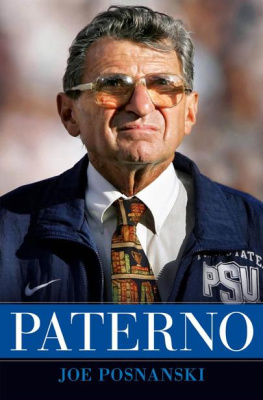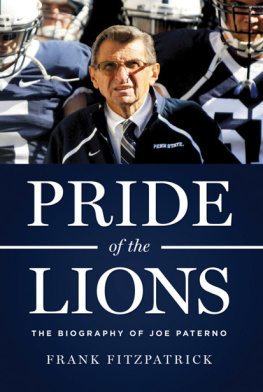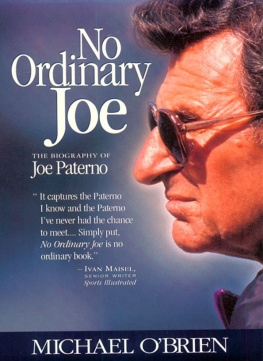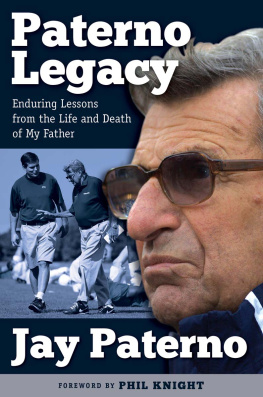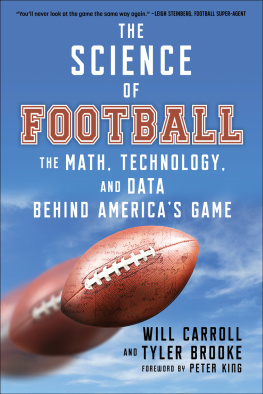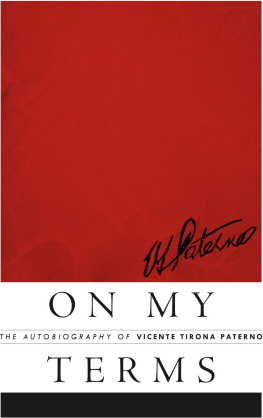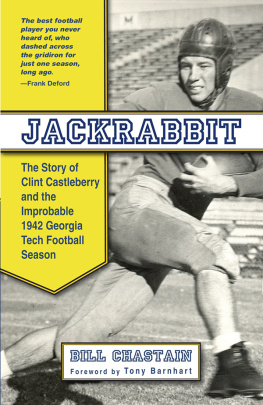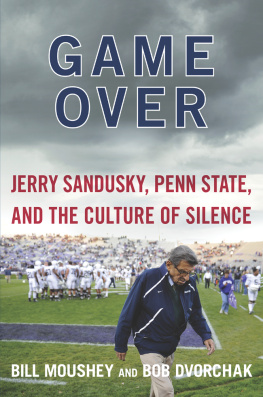Paterno Joe - Paterno
Here you can read online Paterno Joe - Paterno full text of the book (entire story) in english for free. Download pdf and epub, get meaning, cover and reviews about this ebook. City: New York, United States, year: 2012, publisher: Simon & Schuster, genre: Detective and thriller. Description of the work, (preface) as well as reviews are available. Best literature library LitArk.com created for fans of good reading and offers a wide selection of genres:
Romance novel
Science fiction
Adventure
Detective
Science
History
Home and family
Prose
Art
Politics
Computer
Non-fiction
Religion
Business
Children
Humor
Choose a favorite category and find really read worthwhile books. Enjoy immersion in the world of imagination, feel the emotions of the characters or learn something new for yourself, make an fascinating discovery.
- Book:Paterno
- Author:
- Publisher:Simon & Schuster
- Genre:
- Year:2012
- City:New York, United States
- Rating:5 / 5
- Favourites:Add to favourites
- Your mark:
- 100
- 1
- 2
- 3
- 4
- 5
Paterno: summary, description and annotation
We offer to read an annotation, description, summary or preface (depends on what the author of the book "Paterno" wrote himself). If you haven't found the necessary information about the book — write in the comments, we will try to find it.
Abstract: By Americas premier sportswriter, written with full cooperation of Joe Paterno and his family, this account defines the epic life of Americas winningest college football coach. Read more...
Paterno — read online for free the complete book (whole text) full work
Below is the text of the book, divided by pages. System saving the place of the last page read, allows you to conveniently read the book "Paterno" online for free, without having to search again every time where you left off. Put a bookmark, and you can go to the page where you finished reading at any time.
Font size:
Interval:
Bookmark:
Sign up for our newsletter and receive special offers, access to bonus content, and info on the latest new releases and other great eBooks from Simon & Schuster. C LICK HERE TO SIGN UP or visit us online to sign up at
eBookNews.SimonandSchuster.com

Contents
For Margo, Elizabeth, and Katherine
We have difficulty as a nationthis is American, and it relates to our particular timewe have difficulty admiring people. We take such pride in our skepticism. But the natural antithesis of skepticism, the celebration and virtue of accomplishment, is wandering lost somewhere. It is the age of the antihero.BILL JAMES

Joe Paterno runs through the smoke and onto the field before the 2006 Orange Bowl ( Jason Sipes/Altoona Mirror)
Joe Paterno
speech to high school coaches
February 5, 1993, Hershey, Pennsylvania
What is a coach? We are teachers. Educators. We have the same obligations as all teachers, except we probably have more influence over young people than anybody but their families. And, in a lot of cases, more than their families.
To teach an academic subject is certainly not easy, but compared to coaching, it is. We can say two plus two is four to every kid and be sure that we are right. But in coaching, we have to literally get to the soul of the people we are dealing with.
We have to work with emotion, commitment, discipline, loyalty, pride.
The things that make the difference in a persons life.
They look to us for examples. A boy wants to be a man. But he doesnt know what a man is. They look to us for poise. Everybody doesnt get a fair shake in life. They look to us for values. You must relate athletic experiences to life. You are role models.
They look to us for consistency. We have to realize a kid will love us one day and hate us the next. That cannot change who we are and what we are about. We are there to help them reach for excellence... and not just win games.
We have to be understanding but tough. Firm. Real firmness is always helpful. Bill Clinton said, I feel for you. Vince Lombardi said, The pain is in your head.
Tom Boswell of the Washington Post wrote about the difference beween excellence and success. He wrote:
Many people, particularly in sports, believe that success and excellence are the same. They are not. No distinction in the realm of games is more important. Success is tricky, perishable, and often outside our control. On the other hand, excellence is dependable, lasting, and largely within our control. Let me emphasize at once that nobody is all one way or another. The desire for success and love of excellence coexist in all of us. The question is: Where does the balance lie? In a pinch, what guides us?
I think we all have to ask ourselves that question. In a pinch, what guides ussuccess or excellence? Which will give us shelter when the storm clouds gather?
T his is the story of a man named Joe Paterno, who in his long life was called moral and immoral, decent and scheming, omniscient and a figurehead, hero and fraud, Saint Joe and the devil. A life, of course, cannot be reduced to a single word, but Joe Paterno had something bold and soaring in his personality that attracted extremes. That boldness compelled him to do remarkable and unprecedented things. That boldness also led people to say that, at the end, his failures destroyed whatever good he had done.
THE OLD MAN SAT AT the kitchen table and stared at the pages scattered in front of him. He did not want to read them. He told his sons and daughters that he already knew what was written there, understood it well enough. He did not need to waste any more time on it. The old man had never been patient about such things. Digest and move on. Win or lose and then plan for the next game. Continue to advance until you run out of ammunition, General George S. Patton had commanded. The old man admired Patton.
Time is our enemy is how the old man said it, and also Put no effort into anything that isnt helpful. There was too much to do. There was no time to linger. But this was different. His sons and daughters insisted that he read every terrible word, that he stop for a moment, just stop, and let those words shock and suffocate him the way they shocked and suffocated millions. Dad, they told him, you have to know what you are up against.
Behind himthrough the living room, past the front door, beyond the lawnthree dozen television cameras pointed at the house. Men and women, many of them young, held notepads and microphones and sandwiches. They drank soda pop through straws poking out of cardboard cups, and they talked to each other, mostly about the lack of hotel accommodations to be found anywhere near this small Pennsylvania town. They stared every now and again at the corner house on McKee Street to see if anything had changed. Did the door crack open? Was a window shade pulled up? They told each other gruesome jokes to pass the time.
To the old mans right was a window, and through it he could see television satellite trucks in the parking lot by the small park next door. The old man had never spent much time reminiscingnostalgia too slowed lifes advancebut lately he had found himself looking out this window and thinking about when his children played tag in that park, threw footballs to each other, spun in circles in the bright sunlight until they fell onto the grass. Those children were grown now, and they moved around him slowly, moons revolving in his gravity, and every now and again they peered in and tried to read the expression on his face. The park outside was called Sunset Park.
The old man tried to concentrate on the pages in front of him, but the words jumped up and stung him. Penetration. Erection. Genitals. Oral. What did these words have to do with him? His life? Even as a boy, when he played quarterback on his high school football team back in Brooklyn, he would lecture his teammates in his high-pitched squeal when one of them unleashed a swear word. Aw gee, come on, guys, lets keep it clean! They thought him a prude even then. He had lived a sheltered lifenot by accident but by choice. The Paternos never even watched any television except The Wonderful World of Disney on Sunday nights. The old man knew many things. He knew Latin. He knew why Aeneas pressed on. He knew where to find good ice cream, the words of the Boy Scout oath, the difference between Johannes Bach and Johann Sebastian Bach. He knew why Hemingway was greater than Fitzgerald and never hesitated to illuminate doubters. He knew the power of opera and spent much of his life working with overtures and intermezzos and arias playing in the background. Most of all, he knew how to turn young men into football players and football players into a football team and football teams into winners. The old man stared at the papers in front of him and asked his children questions about sex that embarrassed everyone, and he wondered if he knew anything at all.
THE TABLE IN JOE AND Sue Paternos kitchen was large and round, as if pulled from Camelot. It was sixty-two inches in diameter, made of light brown oak, and stood thirty-one inches from the floor. The table was built by August Pohland, an architect who lived in Latrobe, Pennsylvania. Everyone called him Augie. He was one of those men who instinctively knew how to fix things, make things, solve problems. My father, said Sue Pohland Paterno, my father could do anything.
Pohland built his first round kitchen table many years before, after he returned from World War II. He made it for his own large family. This table was an inch-by-inch copy of that first one. This table fit neatly into the Paterno kitchen, but only after the kitchen was expanded and renovated, after Joe Paterno had become famous and, to his enduring and vocal embarrassment, wealthy. A thirty-inch lazy Susan stood in the middle, and it turned on a ball bearing discarded from one of the factories in Latrobe.
Next pageFont size:
Interval:
Bookmark:
Similar books «Paterno»
Look at similar books to Paterno. We have selected literature similar in name and meaning in the hope of providing readers with more options to find new, interesting, not yet read works.
Discussion, reviews of the book Paterno and just readers' own opinions. Leave your comments, write what you think about the work, its meaning or the main characters. Specify what exactly you liked and what you didn't like, and why you think so.

